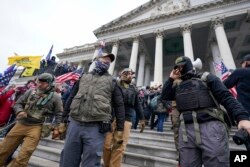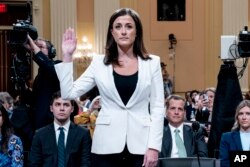The congressional panel investigating the January 6 riot at the U.S. Capitol last year is set to hear testimony Tuesday linking far-right extremist groups to the mayhem as they attempted to block the certification of Joe Biden’s victory in the 2020 presidential election over then-incumbent Donald Trump.
The House of Representatives committee has yet to say who will testify at its latest high-profile hearing, but one is expected to be Jason Van Tatenhove, a self-described “propagandist” for the Oath Keepers, an anti-government militia. Its members were among about 2,000 Trump supporters who stormed the Capitol.
Other testimony is expected to focus on the role played by the Proud Boys, a neofascist group. Five of its leaders have been charged with seditious conspiracy in connection with the insurrection at the Capitol and are awaiting trial later this year. The same charge has been filed against 11 Oath Keepers, three of whom have already pleaded guilty.
Trump has derided the committee’s investigation, calling its nine members — seven Democrats and two vocal anti-Trump Republicans — “political thugs and hacks.”
The question facing the investigative panel is showing what link, if any, the extremist groups had specifically to Trump, while more broadly detailing contacts they had with his political associates as he sought to retain power by upending the official state-by-state vote counts showing that Biden had won.
Central to the hearing is a tweet Trump sent to millions of his followers on Dec. 19, 2020, saying, “Statistically impossible to have lost the 2020 Election. Big protest in D.C. on January 6th. Be there, will be wild!”
Representative Jamie Raskin, the committee member who will be handling much of the questioning Tuesday, told CBS News, “Donald Trump was, of course, the central figure who set everything into motion. He was the person … who identified January 6th as the date for the big protest, and he announced that in his tweet in the middle of the night of December 19th after a crazy meeting (with political aides), one that has been described as the craziest meeting in the entire Trump presidency.”
“And then just an hour or two later,” Raskin said, “Donald Trump sent out the tweet that would be heard around the world, the first time in American history when a president had called a protest against his own government, in fact, to try to stop the counting of Electoral College votes in a presidential election he had lost. Absolutely unprecedented. Nothing like that had ever happened before.”
“So, people are going to hear the story of that tweet and then the explosive effect it had in Trump world, and specifically among the domestic violent extremist groups, the most dangerous political extremists in the country at that point,” Raskin said.
Raskin told online news organization Politico, “Our investigation shows that there was a tremendous convergence of interests between the domestic violent extremist groups and the broader (Make America Great Again) movement” supporting Trump. “This hearing will be the moment when one sees both the convergence of efforts at a political coup with the insurrectionary mob violence. We see how these two streams of activity become one.”
Representative Zoe Lofgren, another committee member, told CNN on Sunday that Trump ally Roger Stone and Michael Flynn, for a short time in 2017 Trump’s national security adviser, were two possible links to the extremist groups.
The protesters who stormed into the Capitol ransacked congressional offices, scuffled with police and for hours blocked the certification of Biden’s victory. Eventually the Capitol building, a symbol of American democracy, was cleared of protesters, and Biden won the Electoral College vote by a 306-232 count.
In the United States, presidents are effectively chosen in separate elections in each of the 50 states, not through the national popular vote. Each state’s number of electoral votes is dependent on its population, with the biggest states holding the most sway.
More than 800 of the protesters have subsequently been charged with an array of offenses from trespassing to assaulting police officers, and more than 300 have pleaded guilty or been convicted in trials. Sentences have ranged from a few weeks in prison to more than four years. The sedition charges filed against the Proud Boys and Oath Keepers carry substantially longer terms.
At Tuesday’s hearing, the committee could also show videotaped segments of closed-door testimony that Pat Cipollone, Trump’s former White House counsel, gave the committee last Friday. He was often in close proximity to Trump in the days before the riot and as Trump watched it unfold on a White House television, refusing entreaties for more than three hours from aides and his older daughter, Ivanka, to call off the rioters.
At its most recent hearing, the panel heard testimony from Cassidy Hutchinson, the top assistant to Mark Meadows, Trump’s last chief of staff, that Trump in the waning weeks of his presidency became increasingly angry and volatile regarding his re-election loss.
She testified that Trump knew some of his supporters at a rally near the White House were armed but still urged them to walk to the Capitol. Hutchinson said Trump berated his Secret Service detail for not driving him to the Capitol, and in December 2020, threw his lunch against a wall of a White House dining room when he learned that then-Attorney General William Barr had concluded there was no election fraud.
Witnesses at earlier hearings told the investigative panel that there were minimal voting irregularities, not enough to overturn Biden’s Electoral College victory.
In addition, Trump was told it would be illegal for then-Vice President Mike Pence to unilaterally block Biden’s victory as Pence presided over the congressional Electoral College vote count. Still, Trump privately and publicly demanded the vice president block certification of Biden’s victory. To this day, Trump contends he was cheated out of another White House term.
Over the weekend, Trump said in a letter that he would allow one of his former aides, Steve Bannon, to testify before the investigative panel. He also said the committee had “allowed no Due Process, no Cross-Examination, and no real Republican members or witnesses to be present or interviewed. It is a partisan Kangaroo Court.”
Republicans blocked a full-scale probe that would have been patterned after the investigation of the 2001 terrorist attacks on the United States.


